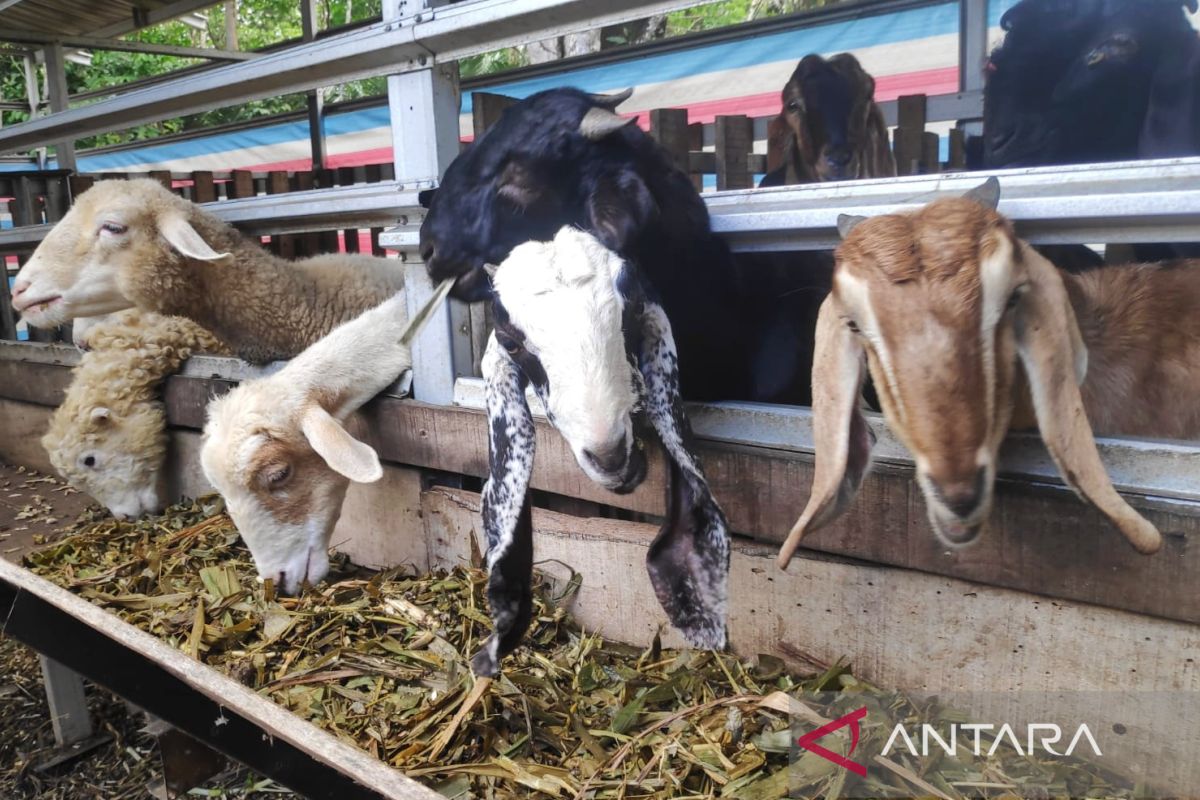Maulana Akbar (35), a farmer from Tapin District, South Kalimantan, has begun to use palm oil waste for goat feed.
"The advantage of using waste from crude palm oil processing plant (solid) that it is very thrifty," said Maulana, who is Chairman of the South Kalimantan Goat and Sheep Farming Association, Tuesday.
Compared to tofu dregs, the young farmer can save 30-40 percent of cost for feeding his 26 saanen goats, jawa rando goats, and sheeps, plus 25 other types of goat for aqiqah needs.
"For 50 goats in a day we use about 20 kg solid with a composition of 60 kg forage fiber and 20 kg processed concentrate," said the former mining worker.
Other positive impacts, in addition to thrifty, according to Maulana, especially livestock health, such as fitter appearance, shiny coat, and increased weight.
"In term of meat growth, I tested six goats in the last 30 days, there was an increase of three to four kg," he said.
He moved to solid since February for the reason of cost of feed using tofu waste was not economical and it is difficult to find in Tapin.
"Tofu was only Rp25,000 per 20 kg, but now it is Rp40,000. Even then it was empty, because many are struggling to buy for animal feed. If I use tofu dregs I need 20 kg for 25 goats a day," he said.
After experiencing solid benefits, he plans to continue to innovate to make alternative feed to meet the nutritional needs of livestocks.
"If price of tofu dregs falls and easy to find, we will combine it with palm oil waste. Not only for goats, fish also can," he said.
Read also: Governor encourages palm oil companies to gain ISPO
Currently, he tried to combine manggot and solid for fish feed. "We try to make feed that is not inferior to factory-processed feed," he said.
Now, Maulana's Bagus Farm in Pulau Pinang Village has the support of a palm oil company. Waste from CPO processing of PT Kharisma Inti Usaha (KIU) factory can nowbe obtained free of charge and sustainably.
In Tapin, he said, there are four palm oil companies that have CPO processing factories.
The Central Statistics Agency (BPS) recorded that in 2018 there were 55,361 hectare of palm oil plantation area in Tapin.
Seeing the potential availability of cheap feed ingredients, he as the first person to utilize palm oil waste in Tapin, invited other livestock farmers to follow his footsteps.
Namely by cooperating with palm oil companies to utilizesolid, it can be through farmers group or villages.
"In Lampung (Sumatra) solid has a price, not thrown away but are bought. We many palm oil companies in South Kalimantan, we should be able to collaborate and take advantage of the existing potential," he said.
Read also: Tabalong farmers develop true seed of shallot
Read also: Banjarmasin govt pushes tarpaulin pond for fish farming
COPYRIGHT © ANTARA News Kalimantan Selatan 2022
"The advantage of using waste from crude palm oil processing plant (solid) that it is very thrifty," said Maulana, who is Chairman of the South Kalimantan Goat and Sheep Farming Association, Tuesday.
Compared to tofu dregs, the young farmer can save 30-40 percent of cost for feeding his 26 saanen goats, jawa rando goats, and sheeps, plus 25 other types of goat for aqiqah needs.
"For 50 goats in a day we use about 20 kg solid with a composition of 60 kg forage fiber and 20 kg processed concentrate," said the former mining worker.
Other positive impacts, in addition to thrifty, according to Maulana, especially livestock health, such as fitter appearance, shiny coat, and increased weight.
"In term of meat growth, I tested six goats in the last 30 days, there was an increase of three to four kg," he said.
He moved to solid since February for the reason of cost of feed using tofu waste was not economical and it is difficult to find in Tapin.
"Tofu was only Rp25,000 per 20 kg, but now it is Rp40,000. Even then it was empty, because many are struggling to buy for animal feed. If I use tofu dregs I need 20 kg for 25 goats a day," he said.
After experiencing solid benefits, he plans to continue to innovate to make alternative feed to meet the nutritional needs of livestocks.
"If price of tofu dregs falls and easy to find, we will combine it with palm oil waste. Not only for goats, fish also can," he said.
Read also: Governor encourages palm oil companies to gain ISPO
Currently, he tried to combine manggot and solid for fish feed. "We try to make feed that is not inferior to factory-processed feed," he said.
Now, Maulana's Bagus Farm in Pulau Pinang Village has the support of a palm oil company. Waste from CPO processing of PT Kharisma Inti Usaha (KIU) factory can nowbe obtained free of charge and sustainably.
In Tapin, he said, there are four palm oil companies that have CPO processing factories.
The Central Statistics Agency (BPS) recorded that in 2018 there were 55,361 hectare of palm oil plantation area in Tapin.
Seeing the potential availability of cheap feed ingredients, he as the first person to utilize palm oil waste in Tapin, invited other livestock farmers to follow his footsteps.
Namely by cooperating with palm oil companies to utilizesolid, it can be through farmers group or villages.
"In Lampung (Sumatra) solid has a price, not thrown away but are bought. We many palm oil companies in South Kalimantan, we should be able to collaborate and take advantage of the existing potential," he said.
Read also: Tabalong farmers develop true seed of shallot
Read also: Banjarmasin govt pushes tarpaulin pond for fish farming
Editor : Mahdani
COPYRIGHT © ANTARA News Kalimantan Selatan 2022

